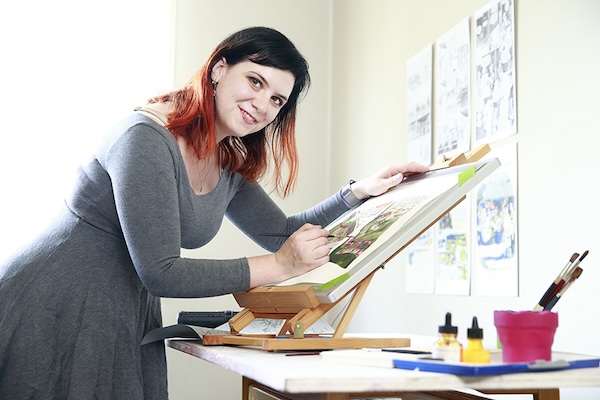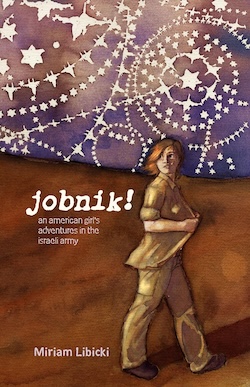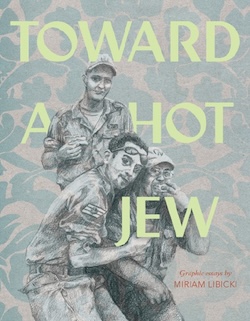Miriam Libicki in 2017, when she was writer-in-residence at the Vancouver Public Library. (photo by Jeff Vinnick/VPL)
The Vancouver Comic Arts Festival (VanCAF) issued a public apology to Miriam Libicki on June 2, eight days after posting online that it was permanently banning the American-Israeli graphic novelist and artist because she had once served in the Israel Defence Forces.
Additionally, the apology stated, the vast majority of the board of directors who had written the May 25 “accountability statement” – which banned Libicki from the festival – have resigned. Those who have remained, the unnamed writers of the apology affirmed, are only there to help assist in the transition to a new board.
In a June 4 social media post responding to VanCAF’s about-face, Libicki, who resides in Vancouver, wrote, “I applaud this. I applaud the entire board responsible for the first accountability statement (which contained no accountability) resigning.”
She added, “This is a really positive and necessary first step. I look forward to a restorative justice process with the new board when there is one, and to see the steps they make to ensure they can act ethically when (and it is a matter of when) a harassment brigade dogpiles again.”
VanCAF’s original statement, which did not mention Libicki by name – nor was it signed by anyone on its board – lamented “the oversight and ignorance to allow this exhibitor in the festival, not only this year but in 2022 as well.”
Libicki’s appearance at the festival, the former board said, “fundamentally falls in absolute disregard to all of our exhibiting artist’s (sic), attendees and staff, especially those who are directly affected by the ongoing genocide in Palestine and Indigenous community members alike. Upon examining these concerns and conducts, this exhibitor will not be permitted to return to the festival.”
The decision to ban Libicki received widespread attention in national and international Jewish and other media. Reports were published by the Canadian Jewish News, the Times of Israel, the Jewish Telegraphic Agency and the Jewish News Syndicate, as well as the popular comics website, The Beat. According to an article on Vancouver arts and culture website Stir, VanCAF was contacted by a lawyer representing Libicki.
On May 29, VanCAF’s so-called accountability statement was removed from its website and social media accounts.
VanCAF’s June 2 apology said the organization wished to “express deep and sincere apologies for the impact our previous statement has caused. First and foremost, to the individual directly affected by our first post.
“The decision was ultimately wrong-headed and moved too quickly and without adequate consultation. We also wish to apologize to the wider impacted community. VanCAF has lost and continues to lose the trust of many we have sought to serve.
“Our statement was one that only represented the VanCAF board at the time of writing and had no relationship to the Roundhouse [the festival’s venue], any of our sponsors, or any former staff. It was solely our own statement.”
The apology finished by announcing that the organization was about to change and that it would strive to prioritize the safety of all attendees, volunteers and exhibitors. By the end of summer, it hoped to have a new team in charge of the festival.
Libicki’s work explores her Jewish identity and the clash of cultures through her own experiences. Her autobiographical comic series, jobnik!, which she self-published in 2008, looks at her service in the Israeli army during the Second Intifada.
Toward a Hot Jew, published by Fantagraphics in 2016, is a series of graphic essays written over about 10 years, from her time in the IDF to her position as an art professor, and is a mix of autobiography, cultural commentary and analysis. In 2017, she was writer-in-residence at the Vancouver Public Library – it was the first time the library had chosen a graphic novelist for the position. She was a 2020 nominee for best short story in the Eisner Awards, considered by many to be the most prestigious honour in the comics industry, for her graphic essay, “Who Gets Called an ‘Unfit’ Mother?” Libicki was one of three graphic novelists selected to tell the stories of four Holocaust survivors in the 2022 book But I Live.
“I am a Jewish artist who makes nonfiction and autobiographical comics,” Libicki told the Canadian Jewish News last month after the VanCAF ban was announced. “I am, and I have consistently, publicly, been pro-peace. I am in favour of a Palestinian state via negotiations. Because of the vulnerable populations I work with, I prefer not to discuss my specific political views in public. I believe all policing of artists’ personal identities and nationalities is wrong.”
Libicki exhibited at VanCAF every year from 2012 until 2022. In 2022, members of the public notified festival volunteers, complaining that VanCAF had included, according to Stir, a Zionist who was showing Zionist propaganda.
Stir reported that Libicki had missed the initial call for applications in 2023 and was not given a table by organizers because they wanted to look into the 2022 incident. This year, VanCAF at first denied Libicki a table, but later said she could be included if she only exhibited But I Live.
Libicki told Stir that she wants to use the recent publicity to garner funds for peace activists in Israel and Palestine. She is selling a watercolour series of seahorses, the proceeds of which will go entirely to the Mothers Call, which Stir describes as “a grassroots collaboration between Women of the Sun in Palestine and Women Wage Peace in Israel.”
In a June 2 social media post, Libicki expressed appreciation for all the messages of support she has received recently and offered a positive outlook.
“I believe we can move towards a peaceful and just (as just as possible) resolution to that public incident,” she wrote.
Sam Margolis has written for the Globe and Mail, the National Post, UPI and MSNBC.



